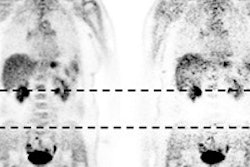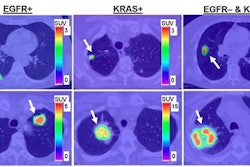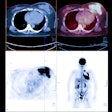Dear AuntMinnie Member,
Could the origins of Alzheimer's disease be related to vascular issues decades earlier? A new study published this week in the Journal of the American Medical Association suggests that could be the case, based on scans acquired using a relatively new PET radiopharmaceutical, florbetapir.
A team led by researchers from Johns Hopkins University analyzed data acquired in the mid-1980s of vascular risk factors of individuals in their 50s with no signs of Alzheimer's disease. They then analyzed risk-factor data acquired 25 years later, and also performed florbetapir-PET scans to measure the levels of amyloid deposits in the brains of study participants.
They found that 61% of individuals who had two or more vascular risk factors in their 50s had elevated amyloid levels 25 years later, nearly twice as many as the 31% of adults with no midlife risk factors. The accumulation of amyloid has been associated with the development of Alzheimer's disease.
Learn more about this intriguing new study by clicking here, or visit our Molecular Imaging Community at molecular.auntminnie.com.
Doctor survey baffles breast screening skeptics
Skeptics of breast screening are expressing frustration and bafflement at a new survey indicating that a strong majority of primary care doctors still recommend mammography screening for women in their 40s.
In a research letter published April 10 in JAMA Internal Medicine, more than 80% of primary care providers and gynecologists said they still recommend that women start breast screening at age 40. This is despite the fact that since 2009 the U.S. Preventive Services Task Force (USPSTF) has advised that the decision of whether to screen these younger women be a personal choice, rather than an automatic recommendation.
In an opinion piece on the findings, two longtime skeptics of breast screening, Dr. Deborah Grady and Dr. Rita Redberg, both of the University of California, San Francisco, characterized the findings as "dispiriting" and questioned why doctors weren't following the USPSTF guidelines more closely, instead of preferring the screening advice of physician associations. Read more by clicking here.
In a related study on breast imaging, click here for a story on how reading digital breast tomosynthesis exams immediately after they are acquired doesn't necessarily increase recall rates. These stories and more are in our Women's Imaging Community at women.auntminnie.com.




















